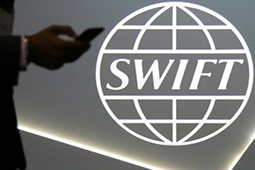
SWIFT Unlinks Iran's Central Bank


that Washington would be strictly enforcing its sanctions regime against Tehran and said there would be "a lot more from the US on Iran."
It is not clear yet, however, which banks will be chosen to conduct trade for humanitarian purposes such as food and drugs, which the US says are not sanctioned.
On November 8 the US Treasury removed several banks and credit institutions from both the Specially Designated Nationals (SDN) list and its secondary sanctions without providing any specific reasons for its action.
Among the exempted lenders are Hekmat Iranian Bank, Qarz Al-Hasaneh Mehr Iran Bank and Khavarmianeh Bank (Middle East Bank).
The Central Bank of Iran said in a statement late Monday that the SWIF ban would have no effect on Iran's bank accounts and its foreign exchange settlement since it is only "an inter-bank messaging system."
It added that since a disconnect from SWIF for Iranian banks had been anticipated, alternative messaging systems have been developed and became operational a long time ago.
The bank, however, has not yet responded to the possible effects on CBI itself being cut off from SWIFT.
Unconcerned About SPV
Mandelker said Washington is not concerned about the idea of creating a special-purpose vehicle (SPV) in the EU to work with Iran, expressing confidence that the US and Europe could still work together. She opined that despite the idea of an SPV, foreign "companies already are leaving Iran."
"I am not concerned by the SPV actually at all. I think the bigger news in Europe is that companies are withdrawing from Iran in droves," she was quoted as saying.
SWIFT, a global messaging network designed for organizing financial communications between banks, earlier announced that it would sever its links to several Iranian banks and institutions for the sake of the overall stability of the network. The organization didn't say directly that it was cutting off Iranian banks subject to the new US sanctions.
The announcement by the financial messaging network came on the same day as US Treasury Secretary Steven Mnuchin and Secretary of State Mike Pompeo announced the imposition of sanctions against the Iranian banking, energy and shipping spheres.
Several days prior to the announcement, Mnuchin warned that SWIFT is no different than any other entity and could therefore also fall under secondary sanctions if it were to continue to work with Iranian banks.
Gold and Other Options
Stockbroker-turned broadcaster Max Keiser told RT that the blacklisting of Iran from international financial messaging system SWIFT serves as a warning to Washington’s enemies, but will hasten the demise of the dollar.
He said that in pushing a hard line on Iran, the US will only force other countries to come up with alternatives, and stockpile gold to lessen their dependence on the almighty US dollar.
The US puzzlingly seems to want to expedite global de-dollarization with its ill-advised weaponization of SWIFT,” Keiser said.
“The impact this is having globally is clear. Russia and China are developing an alternative to SWIFT while also buying hundreds of tons of gold as a means to escape the USD chokehold. This in turn will accelerate global de-dollarization.”
“Iran needs to get smart and start hoarding gold and Bitcoin if it wants to avoid the worst of the fallout,” Keiser added.
Economist Steve Keen told RT that in pushing the SWIFT financial messaging system to exclude Iran, the US has “gone rogue,”
Prof. Keen, an economist at Kingston University said that while the global economy is too big to be badly affected by the move, the exclusion of Iran “will emphasize the danger of using a single national currency as the means for international payments.”
Iran’s first digital currency is one step away from launch. The unnamed token, backed by the rial, is awaiting final approval from the CBI.


Trump weighs using $2 billion in CHIPS Act funding for critical minerals

Codelco cuts 2025 copper forecast after El Teniente mine collapse

Electra converts debt, launches $30M raise to jumpstart stalled cobalt refinery

Barrick’s Reko Diq in line for $410M ADB backing

Abcourt readies Sleeping Giant mill to pour first gold since 2014

Nevada army depot to serve as base for first US strategic minerals stockpile

SQM boosts lithium supply plans as prices flick higher

Viridis unveils 200Mt initial reserve for Brazil rare earth project

Tailings could meet much of US critical mineral demand – study

Kyrgyzstan kicks off underground gold mining at Kumtor

Kyrgyzstan kicks off underground gold mining at Kumtor

KoBold Metals granted lithium exploration rights in Congo

Freeport Indonesia to wrap up Gresik plant repairs by early September

Energy Fuels soars on Vulcan Elements partnership

Northern Dynasty sticks to proposal in battle to lift Pebble mine veto

Giustra-backed mining firm teams up with informal miners in Colombia

Critical Metals signs agreement to supply rare earth to US government-funded facility

China extends rare earth controls to imported material

Galan Lithium proceeds with $13M financing for Argentina project

Kyrgyzstan kicks off underground gold mining at Kumtor

Freeport Indonesia to wrap up Gresik plant repairs by early September

Energy Fuels soars on Vulcan Elements partnership

Northern Dynasty sticks to proposal in battle to lift Pebble mine veto

Giustra-backed mining firm teams up with informal miners in Colombia

Critical Metals signs agreement to supply rare earth to US government-funded facility

China extends rare earth controls to imported material

Galan Lithium proceeds with $13M financing for Argentina project

Silver price touches $39 as market weighs rate cut outlook

















